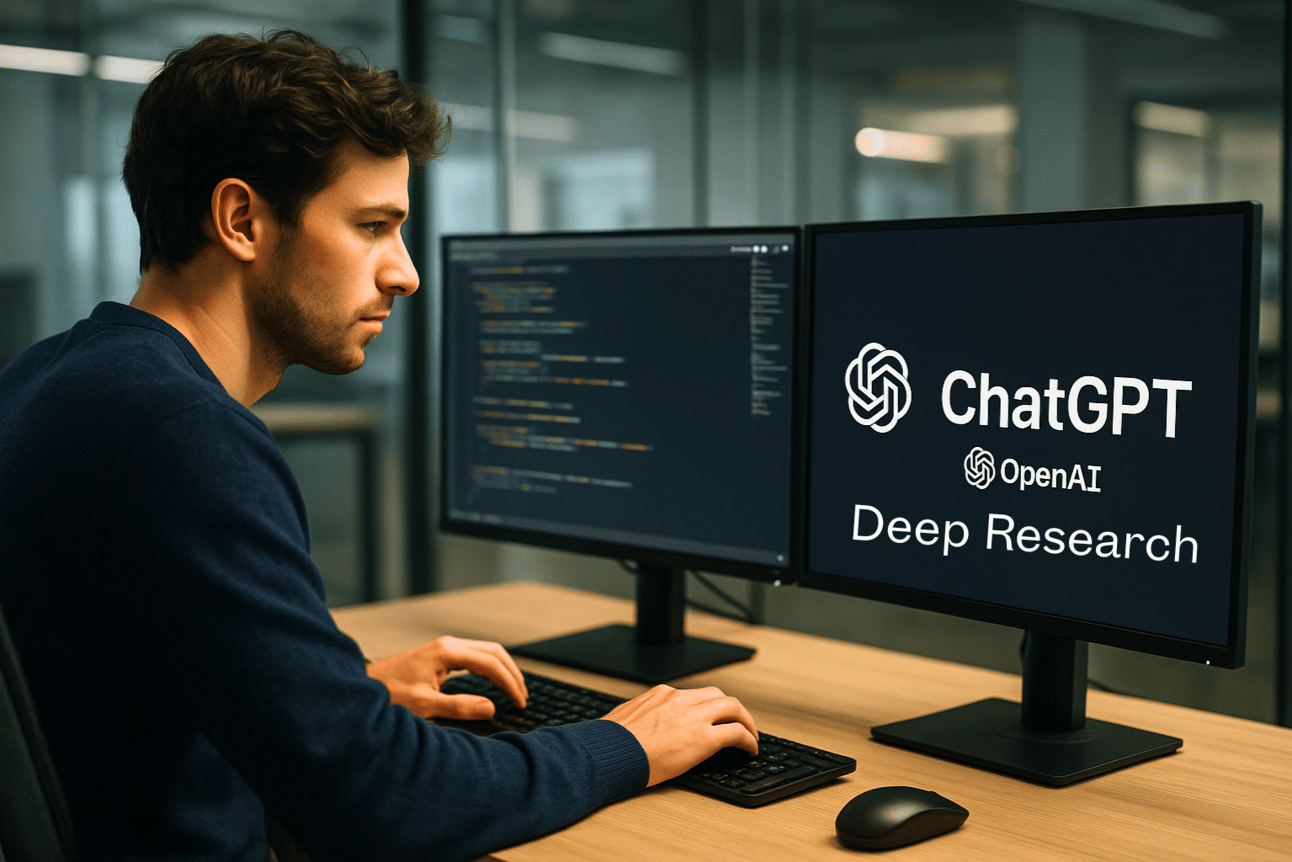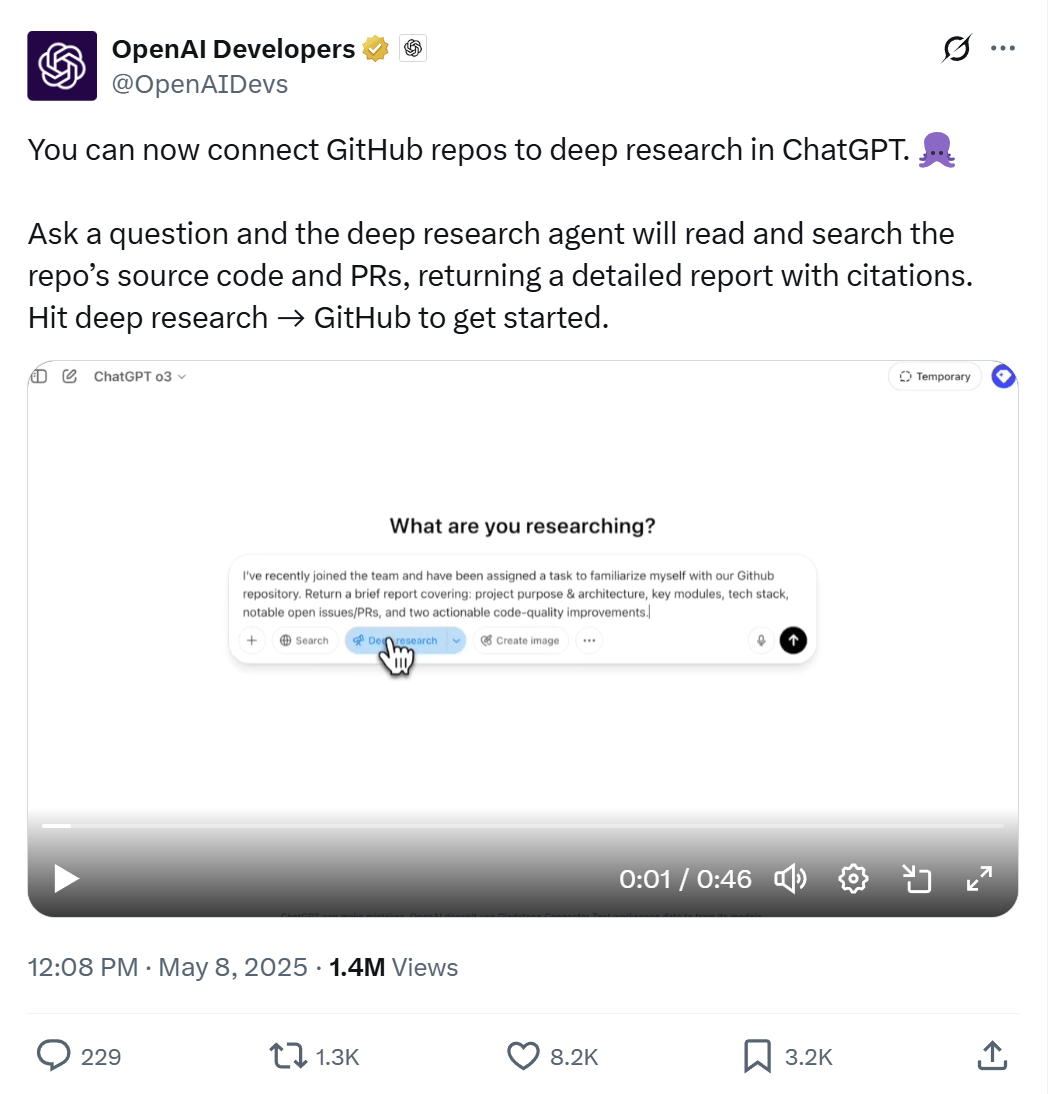
Image Source: ChatGPT-4o
OpenAI Adds GitHub Connector to ChatGPT Deep Research Tool
OpenAI is expanding the capabilities of its AI-powered “deep research” feature by introducing a GitHub connector, allowing users to analyze codebases and engineering documents directly through ChatGPT.
The GitHub connector marks the first official integration for ChatGPT deep research, a tool designed to compile thorough reports by searching across the web and other sources. With the new connector, developers can now link to GitHub and ask questions about codebases, break down product specifications into technical tasks, summarize code structures, and better understand API implementation using real code examples.
The GitHub integration will roll out to ChatGPT Plus, Pro, and Team users over the next several days, according to an OpenAI spokesperson. Support for Enterprise and Edu accounts is expected to follow soon.
Enhancing ChatGPT’s Practical Applications
The launch of the GitHub connector reflects a broader push by AI companies to make their chatbots more useful by linking them to external platforms. Anthropic, for example, recently launched "Integrations," which connects apps directly to its Claude chatbot.
OpenAI had previously experimented with plugin capabilities for ChatGPT but later shifted toward supporting custom-built chatbots, known as GPTs. The new GitHub connector revives the idea of direct platform integration in a more targeted way.
“I often hear that users find ChatGPT’s deep research agent so valuable that they want it to connect to their internal sources, in addition to the web,” said OpenAI Head of Business Products Nate Gonzalez in a blog post on LinkedIn. “[That’s why] today we’re introducing our first connector.”
While OpenAI promotes the tool as a time-saving resource for developers, the company acknowledges that ChatGPT deep research is not infallible. Like other AI models, it carries the risk of "hallucinations," where the AI confidently generates incorrect information. OpenAI emphasizes that the tool should assist rather than replace expert judgment.
An OpenAI spokesperson said that ChatGPT will respect organizations’ existing permission settings, ensuring users can only view GitHub content they are already authorized to access and codebases that have been explicitly shared with ChatGPT.
A Growing Focus on Assistive Coding Tools
The GitHub connector is part of OpenAI’s broader investment in assistive coding tools. Recently, the company introduced Codex CLI, an open-source tool designed to help developers navigate terminal commands, and updated the ChatGPT desktop app to better interact with several developer-centric coding applications.
OpenAI has also been active in expanding its footprint in the AI coding assistant space. The company has reportedly reached an agreement to acquire Windsurf, an AI-powered coding tool, for $3 billion.
New Fine-Tuning Options for Developers
Separately, OpenAI announced new fine-tuning capabilities for its latest models on Thursday. Developers can now fine-tune the o4-mini model—optimized for reasoning tasks—through a method called reinforcement fine-tuning, which uses task-specific grading to enhance performance. Fine-tuning is also now available for OpenAI’s GPT-4.1 nano model.
Fine-tuning access varies depending on user status:
Only verified organizations are allowed to fine-tune the o4-mini model.
Fine-tuning for GPT-4.1 nano is open to all paying developers.
OpenAI began requiring verification for access to certain models and developer features in April. Organizations must submit identity documentation as part of the process, a move the company says is aimed at preventing misuse.
What This Means
By linking ChatGPT directly to GitHub, OpenAI is taking a major step toward embedding its AI tools more deeply into developers’ everyday workflows. The move reflects growing demand for AI systems that can act not just as information retrievers but as active participants in real-world tasks like code review, documentation, and project planning.
As OpenAI strengthens its developer-focused offerings, it is positioning ChatGPT as an integral part of the modern software development process — a shift that deepens its influence across the coding landscape.
By connecting research, code analysis, and application building more tightly, OpenAI is staking a larger claim in the future of software development powered by AI.
Editor’s Note: This article was created by Alicia Shapiro, CMO of AiNews.com, with writing, image, and idea-generation support from ChatGPT, an AI assistant. However, the final perspective and editorial choices are solely Alicia Shapiro’s. Special thanks to ChatGPT for assistance with research and editorial support in crafting this article.

